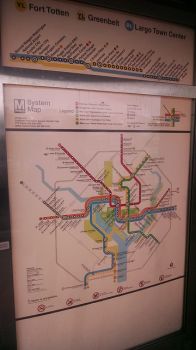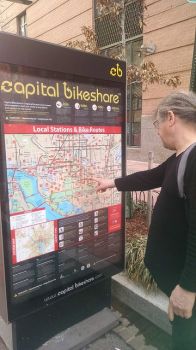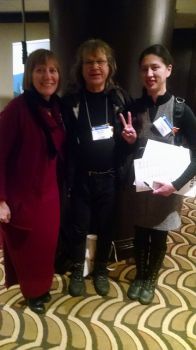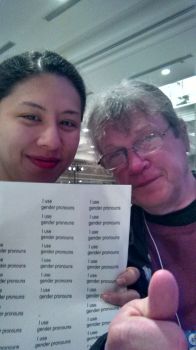By Tina Marie Whittaker
Thank you!
I appreciate all of the people that donated money. It was very kind and allowed me to go to DC. Such generosity!
Washington DC
I thought DC was amazing! The bike share was very well put together. The cross walk signals were long so it was easy to cross as a pedestrian. The people were extremely kind and gracious. Also, Nelle was kind to offer me a place to stay. It was a beautiful house and it was surrounded by amenities, like the Indian restaurant where we had lunch and a Montessori school. Nelle’s place was close to a Metro stop; Metro stops were very convenient wherever we went.

Wheelwomen Switchboard Happy Hour Networking Event
Monday night, I attended the Wheelwomen Switchboard Happy Hour Networking Event. It was at this meeting that I felt I would be accepted and welcomed to the Forum. Even by people from places that I would consider “conservative.” It was well attended! The room was crowded and we overflowed into the next room. I talked to at least fifteen people about Grease Rag, our purpose, what we do, and I asked about what they did, what their goals were, and what challenges they face. I found that most of their challenges were challenges that we face. For example, getting people involved, getting the infrastructure we want, and being inclusive of minorities. I met someone from Georgia, Mississippi, Iowa, Wisconsin, Montana, Arizona, Nevada, California, and Nebraska! (And I met people from even more states during the Forum the next day.) I was impressed with our similarities, outside of our shared challenges. Everyone I talked to was excited about what they were doing and despite the challenges they seemed optimistic.

National Forum on Women Biking
Before the Forum started, I was nervous about the goals of the Forum and the direction it would take because it depends a lot on the organizer, and this was my first time at the Forum and Liz Cornish Jones’s first time organizing.
A Case Study in Leadership: How Mentorship and Bold Leadership is growing the mission of Tulsa Hub
The new organizer, Liz, was introduced and impressed me on what she was expecting: it was going to be an event open to a range of genders. Then she introduced Ren Barber from Tulsa Hub. I was inspired by her honesty. She was truthful about her weaknesses, and she was able to admit she didn’t know what to do and asked for outside help. Barbara Bannon joined her on stage and talked about what they had to go through to get Tulsa on the right track. It made me wonder if the goals of the a Tulsa Hub were similar to the goals of Grease Rag, even though they were for all genders. Grease Rag focuses on a more narrow group.
After the talk, I felt that Grease Rag is going fine. Grease Rag’s aims and goals were different from Tulsa Hub’s goals, and my thinking is that doing programming for WTFs-only means we don’t have the same problems. But it was interesting to see what they were going through as a bike group.
Discovering Heart Leadership
Ashley Fullenwider and Laura Todd from Nuu-Muu lead a “speed-dating” exercise of three-minute conversations.
1. Ask the person what their work involves
2. What about their work energizes them the most
3. Look everyone you meet in the eye, and tell them three leadership qualities you see in them
After the exercise, we returned to our tables, and discussed what we learned, with focus on the leadership qualities. We took turns reflecting on the experience with these prompts.
1. Did you believe what people told you about your leadership skills?
I thought no matter what they said, that everyone had all of those skills. You might not use the skills or you might have been put down or you might not have confidence to use those skills, but everyone had them. Some people might not have leadership confidence because they have been put down because of their gender. I’ve seen this: in highschool I saw girls that knew their stuff, but didn’t say anything because they were afraid to stay from the gender norm. So it appeared like they didn’t have skills, but they definitely did.
2. What did you base your three leadership skills that you picked for others on?
Most said that they based their opinions on looking the person in the eyes. I used three senses
Touch- when we shook hands I noticed their grip strength
Sight- looking at how people held eye contact or looked away, and how they smiled
Listening- how steady, determined, and strong their voice was
3. What is the difference between a men’s group and a women’s group?
We had the men in our group, and they all said that the go-around was much different from what it would have been in a men’s group. They said it would have been more competitive- who is strongest?
The women didn’t really have an answer because we didn’t have experiences with men’s groups.
We shared our findings with the larger group, and our group was similar to the others.
I found that people took it seriously, and I think that people really meant what they said, in addition to being very open about listening. It was a close space, but we made it work.
Women Ride: New Numbers
Martha Roskowki from People For Bikes presented some numbers from a recent survey.
Advocacy Through A Gender Lens
I knew Low would be talking about trans* inclusion, but I didn’t know the other panelists or their views. I didn’t want to come in with any preconceptions. I also had no idea where the moderator Barb Chamberlain as going to take the conversation, and what kinds of questions she would ask.

Everyone had three cards in front of them. We were told to hold up a card when asked to respond to a statement.
“I prefer pie to cake.”
Green-that is true for me right now
Yellow-I’m not sure/ I have no preference
Red- that is not true for me right now
I wasn’t so sure how accurate the cards were for “taking the temperature of the room.” People might have been trying to be politically correct, or were peer pressured. So I took it with a grain of salt.
I was pleasantly surprised, because I didn’t know Maryann Aguirre and Rio-Jill Contreras from Ovarian Psyco-Cycles, that they spoke so openly about trans* inclusion. But I knew what Low was going to say, so I wasn’t surprised there. Odessa Phillip was focused on male and female dynamics on the job. I wasn’t sure how she felt outside of her job about gender issues.
After the discussion I felt really good. I thought it was a good, positive talk. It didn’t matter to me that I wasn’t up there, as long as Grease Rag got to say what we wanted to say. The questions were geared toward bringing out a good discussion. I especially liked that three of the panelists were strongly in favor of trans* inclusion.

Building The Movement: Constructing A Plan For Women Bike Advocacy In Your Community
Coming from the “Advocacy Through A Gender Lens” panel, I felt very positive.
Kim Foltz from the City of Boston, Amy George from Women & Bikes Richmond, and Lesly Jones from Black Women Bike DC talked about their work, and Nelle Pierson talked about her work at Washington Area Bicyclists Associations and moderated the panel. Lesly and Nelle talked about collaborating with each other to make things happen. Tyler Frisbee represented Sam Francisco Bicycle Coalition/Women Bike SF, and Casey Ashenhurst talked about WE Bike NYC.
All of the speakers talked about how they created community. Each person talked about different parts of their work, but they all had “creating community” in common. Casey talked about diversity, specifically a Spanish-speaking bike group that was flourishing, as well as a Moms on Wheels group. Women Bike SF’s goal was to advocate for liveable bike infrastructure for living and safety. They were just organizing-only six months old! Lesly wasn’t picky about white riders joining their group, even though it is a group focused on black riders. Kim was proud of the fact that they were the first city with bike share, and since they started, their program has doubled. WE Bike suggested that social media platforms are the key to growing.
My impression was that WE Bike was the most similar group to Grease Rag. The only thing I did not care for was the format for Q&A. You could only submit panel questions with Twitter, and I don’t own a smart phone. I wanted to ask the City of Boston and WE Bike about the idea of becoming “Sister Cities,” where people from each city travel to the other’s events!
Closing
I teared up. I thought the way Rue Mapp spoke about family and how people bond in nature was inspiring. She talked about people being tied to the environment,
whether it was with bikes or hiking or anything else-it didn’t matter. Just get out into nature. Going out into nature is one way to heal from racial tensions in Ferguson (she was not involved in the protests) and the 50 year anniversary of Selma.
After everything, I felt very positive about the Forum. Next year, I hope Grease Rag people have the opportunity to go.
Thank you, everyone in Grease Rag, for enabling me to go to this forum in Washington DC. I hope that this report shows you that I tried my best to represent Grease Rag.
– Tina
